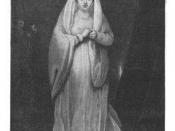William Shakespeare's tragedy Macbeth is a classic dramatic work. It encompasses many traditional elements such as conflict, hubris, initially high position, tragic flaw, and imminent downfall. Nevertheless, although customarily a tragic flaw belongs to the protagonist of the play, in Macbeth it is distributed amongst several prominent characters. Macbeth's tragic flaw is the ambition of power and it serves to express one of the main themes, through which the author ultimately aspires to provide social commentary. Lady Macbeth possesses this weakness for power, which is explored as a theme in this play. Her soul is therefore torn in conflict as such bold ambition goes against the feminine values of her times. She is thus an example of a character whose soul is torn between two equally strong subjects or emotions. These emotions are ambition for power and fear, dictated by standard femininity. The diction and action of this play clarify Lady Macbeth's internal struggle.
In turn, this battle conveys important themes of the play, such as the meaning of feminniity and wickedness of ambition for power.
In this play, as in any dramatic work, William Shakespeare does not speak though his own words in describing Lady Macbeth. Yet, both Lady Macbeth and her fellow personages use vivid and direct word choice to not only show her character, but also to reveal the tough battle she fights in her head. Lady Macbeth asserts herself early in the play with immediate response to the prospect of higher social standing. She speaks brave words, swears that she can easily assume the role prescribed to a man, or kill her own offspring. With these words it seems as her ambitions for power win over her feminine and reticent fright. Her very tone is especially compelling because her determination for authority is introduced...


